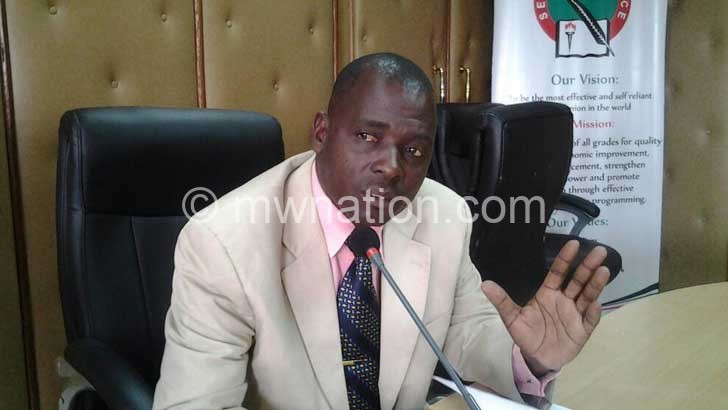Schools reopen amid chaos
As schools reopen today after an indefinite closure on March 23 2020 due to Covid 19, stakeholders have said government is yet to address sticky issues, including provision of adequate safety materials and risk allowances for teachers.
The Teachers Union of Malawi (TUM), which earlier threatened not to return to work if Capital Hill would not provide risk allowances, has since issued a two-week ultimatum for government to resolve their demand for risk allowances.
In an interview yesterday, TUM secretary general Charles Kumchenga said they met the Government Negotiating Team (GNT) and ministry officials on Friday and Saturday but the issue remains unresolved.
He said : “We met the GNT on Friday to discuss the allowance, among other things. We were told the matter was referred to the Presidential Task Force on Covid-19, and that the GNT is waiting for the task force to respond.

“On Saturday, we also met Secretary for Education Chikondano Mussa, and we had a long discussion, where we were also told that they are waiting for the task force to respond. We have given government two weeks to push the task force to respond.”
Kumchenga also said while government has provided soap and buckets to facilitate the reopening of schools, personal protective equipment (PPE) are also in short supply, including masks for teachers and soaps for hand washing.
He said they were told during the meeting that government was working hard to deal with the situation.
Said Kumchenga: “’We still believe that the PPEs have not been adequately distributed to schools, so Mussa said the ministry will continue distributing to deal with those shortfalls in all schools.”
But in a separate interview, Mussa said they were impressed with the state of preparedness, urging learners to return to school and asking schools committees to help monitor compliance of Covid-19 preventive measures.
She said: “Training of teachers was in progress last week, so we are ready. We have involved the communities because teachers will be busy with teaching, so we depend on the goodwill of committees like mother groups to monitor compliance of pupils, teachers and community members.”
On risk allowances for teachers, Mussa said the matter was beyond her ministry.
Last week, Minister of Education Agnes NyaLonje told The Nation that the decision on risk allowances has to be made at the central level as it may have implications across the civil service.
Said the minister: “Issues of allowances are dealt with at central level by the Human Resource Department which is under OPC [Office of the President and Cabinet]. That is one of the issues the Presidential Task Force on Covid-19 has, for the past two weeks, been deliberating on. The discussions are ongoing.”
There are over 90 000 teachers in Malawi—76 442 in primary schools and 14 398 in secondary schools—according to the 2017/18 Annual Education Statistics Bulletin.
If all of the 90 840 teachers were given the minimum K20 000 monthly risk allowance across the board that the lowest health worker gets, government would be spending K1.8 billion per month on allowances alone.
In daily updates on the pandemic yesterday, co-chairperson of the Presidential Task force on Covid 19, Dr John Phuka, reminded parents, learners and teachers on the basic prevention measures of Covid-19 in schools.
He stated in part: “Sick learners, teachers and other staff should not come to school. Schools should enforce regular hand-washing with safe water and soap, alcohol rub/hand sanitiser or chlorine solution.”
Meanwhile, Civil Society Education Coalition (Csec) executive director Benedicto Kondowe has asked other stakeholders to support government’s efforts in ensuring a safe environment, observing that most schools will not open at the level government anticipated.
He concurred with Kumchenga on inadequate resources, saying schools like Mkoma and Mwenyekondo in Lilongwe have been given only K200 000 each for orientation and buying of materials.
Said Kondowe: “There will still be glaring gaps that will need to be responded to as soon as possible. What can K200 000 do for schools to implement all the measures like training, buying of buckets and soap?
“This is where as NGOs [non-governmental organisations] we need to support schools that are within our catchment areas so that we achieve a safe reopening.”
On his part, Independent Schools Association of Malawi (Isama) president Joseph Patel urged teachers to ensure social distancing is observed among pupils, that they are all wearing masks and that they frequently wash hands.
He said apart from Covid-19 issues, they are also asking teachers to provide remedial classes in the morning or during weekend so that learners in examination classes make up for the lost time.
In a separate interview, educationist Steve Sharra said while it is important that schools reopen today, government should ensure the needs of everyone involved are met.
“Teachers need to feel safe and contented to discharge their duties. In the broader sense, this is about demonstrating to teachers that as a country we appreciate and value them,” he said.
Public schools and universities are scheduled to re-open today. The reopening will be in phases with the first phase targeting final year university students, students in examination classes (Form Four and Standard 8) and Initial Primary Teacher Education 14 students.
Government directed that schools should close on March 23 this year as a Covid-19 preventive measure. On April 2, Malawi registered its first three Covid-19 cases, which escalated to 5 614 including 175 deaths by last evening.
In April, TUM demanded that once schools re-open, they should be given the same risk allowances as healthcare workers.





